Top Residential Proxy Service Providers for 2025: Tools for Advanced Web Scraping
By The Visualping Team
Updated November 29, 2024

Top Residential Proxy Service Providers for 2025: Tools for Advanced Web Scraping

Residential proxy services have become essential tools for businesses and individuals seeking to maintain online anonymity and access geo-restricted content. These services route internet traffic through real residential IP addresses, making it appear that the user is browsing from a genuine home network. Oxylabs and Smartproxy are among the top residential proxy service providers, offering extensive IP pools and reliable performance.
Consider IP pool size, pricing, and additional features when choosing a residential proxy service. Some providers, like IPRoyal, offer competitive pricing starting at $1.75 per GB of bandwidth. Others, like Bright Data, provide a comprehensive suite of proxy-related services and boast a vast network of over 72 million IP addresses.
The residential proxy market continues to evolve, with providers starting to claim 100% success rates and offering advanced features such as static residential proxies and enhanced geo-targeting capabilities.
Understanding Residential Proxies
 Residential proxies provide anonymity and reliability for online activities. These tools route internet traffic through residential IP addresses, offering unique benefits for various use cases.
Residential proxies provide anonymity and reliability for online activities. These tools route internet traffic through residential IP addresses, offering unique benefits for various use cases.
What Are Residential Proxies
Residential proxies are intermediary servers that use IP addresses assigned to real residential devices. Unlike data center proxies, these IPs come from internet service providers and are associated with physical locations. Residential proxies act as a bridge between users and target websites. When a request is made, it first goes through the proxy server, which then forwards it to the destination using a residential IP address.
This process masks the user's original IP, making it appear that the request is coming from a regular household. The SOCKS5 and HTTP(S) protocols are commonly used for residential proxy connections, offering different levels of security and speed.
Benefits of Using Residential Proxies
Residential proxies offer several advantages:
- Enhanced anonymity: Websites are less likely to detect and block residential IPs
- Geolocation accuracy: Access location-specific content from various regions
- Higher success rates: Lower chance of being flagged as suspicious traffic
- Bypassing restrictions: Overcome geographical limitations on content
These proxies provide a layer of privacy, making it difficult for websites to track user activity. They also allow for more natural-looking traffic patterns, which are important for tasks like web scraping and market research.
Residential proxies often rotate IP addresses automatically, further improving anonymity and reducing the risk of detection.
Common Use Cases for Residential Proxies
Residential proxies serve various purposes across different industries:
- Web scraping: Collect data from websites without getting blocked
- Ad verification: Check competitor ads in different locations
- SEO monitoring: Track search engine rankings from various regions
- Social media management: Manage multiple accounts without suspicion
- E-commerce: Compare prices and monitor product availability
- Market research: Gather location-specific data and trends
Businesses use residential proxies to access geo-restricted content and conduct competitive analysis. Individuals may use them to protect privacy or bypass censorship in certain countries.
These proxies are particularly useful for tasks that require appearing as a regular internet user from a specific location.
Top Providers of Residential Proxies
Residential proxy providers offer access to IP addresses assigned to real residential devices. These services enable users to browse the internet anonymously and access geo-restricted content.
Several companies stand out in this competitive market.
Oxylabs
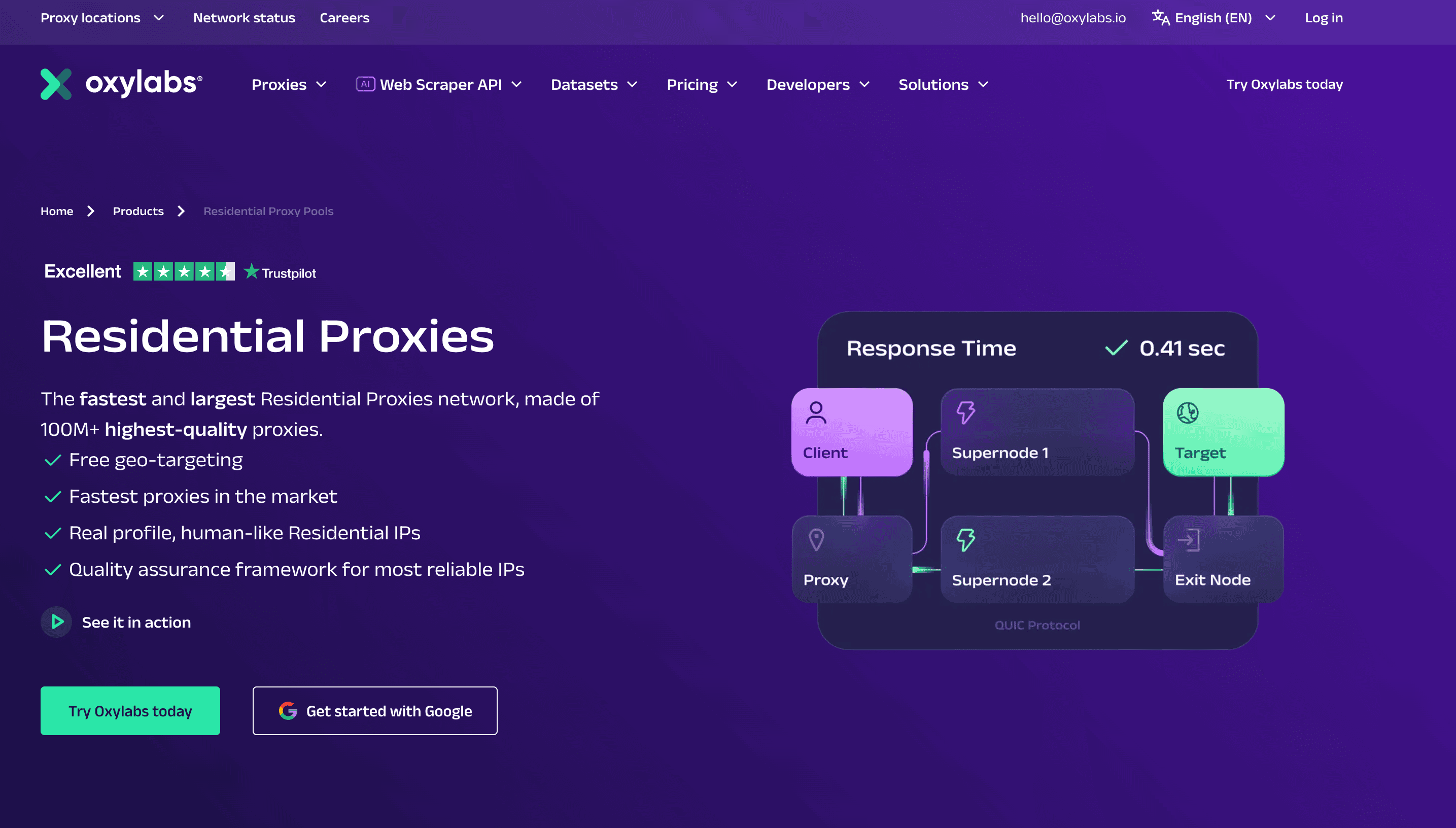
Oxylabs residential proxies boast an impressive 99.95% success rate and average response times of 0.6 seconds, making them a reliable choice for web scraping and market research tasks. These performance metrics underscore the efficiency and dependability of Oxylabs' proxy network, which can be crucial for businesses relying on accurate and timely data collection.
Reviewers consistently praise Oxylabs for its diverse proxy offerings, including residential, datacenter, and mobile proxies. The company's commitment to providing customizable solutions has garnered attention from industry experts, with PCMag highlighting Oxylabs' extensive features and country coverage. This combination of performance, variety, and customization options positions Oxylabs as a top contender in the competitive proxy service market.
They offer:
- Rotating and static residential proxies
- City and ASN targeting
- Dedicated account managers
- Advanced proxy rotator
Oxylabs offers a pay-as-you-go model for light users, allowing you to only spend on what you use each month. This subscription is $8 per GB and is capped at 50 GB. Oxylabs recommends that users who need 50 GB + in bandwidth should subscribe to their Advanced tier or above.
Bright Data
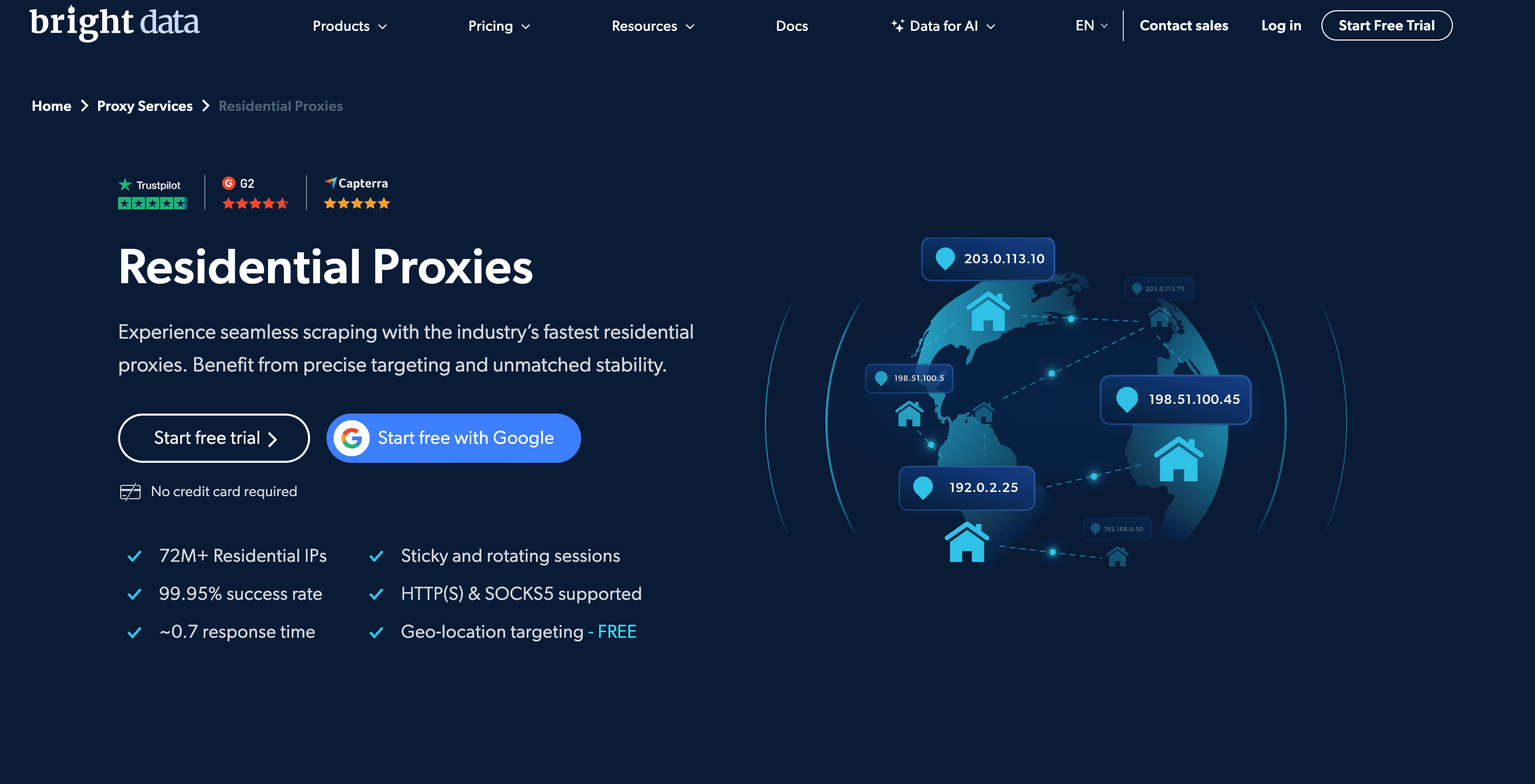
Bright Data stands out as a leading provider in the competitive world of proxy services. The company's Web Unlocker technology utilizes proxy infrastructure alongside request management and CAPTCHA resolution. This aims to deliver near-perfect success rates.
Users online are positive on Bright Data's responsive support team and knowledgeable account managers. While pricing may be higher compared to some competitors, general consensus finds the service offers good value for money. This is especially true with flexible plans and volume-based discounts available.
Brightdata pricing starts from $8.4 per GB on a pay-as-you-go model, which allows users to only spend on the bandwidth that they actually use. The next tier up starts at 69 GB and is $499 per month. Custom solutions are available for enterprise or large-scale operations.
They offer city and country-level targeting options across 195 countries. Bright Data's service includes features like:
- Rotating and static residential IPs
- SOCKS5 support
- API and browser extensions
- Advanced targeting options
Their proxy management dashboard allows users to monitor usage and set customized rules. Bright Data emphasizes compliance and ethical sourcing of IP addresses.
Smartproxy
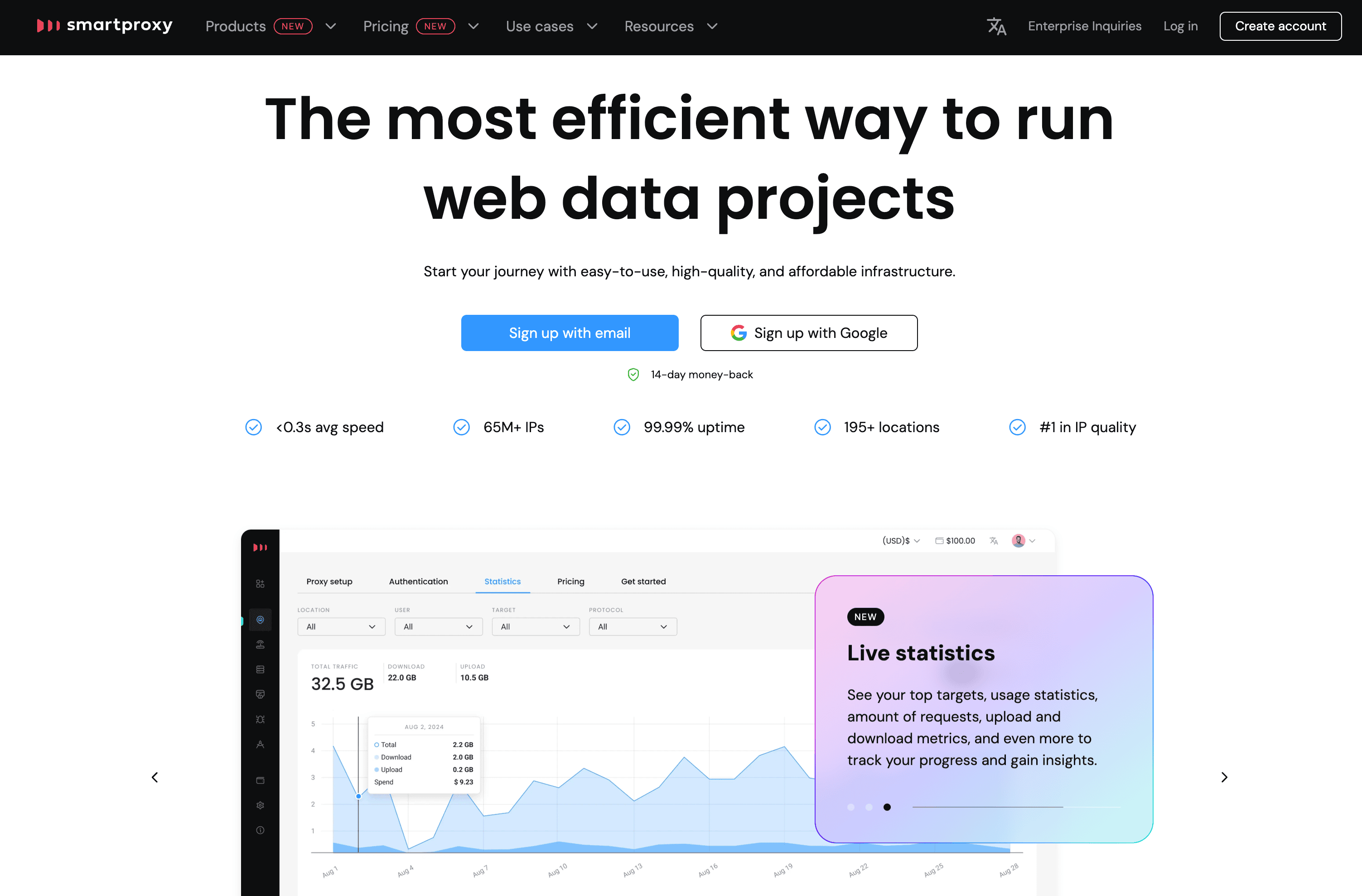
Smartproxy's residential proxy network claims over 65 million IP addresses spread across 195+ locations worldwide, providing users with wide geographic coverage and a diverse pool of IPs. Their network claims seamless rotation of IP addresses, enhancing anonymity and reducing the risk of detection or IP bans during web scraping or other online activities.
Reviews of Smartproxy's residential proxy service generally highlight its performance and versatility. Users appreciate the service's ability to handle high-volume requests and its compatibility with various use cases, including market research, social media management, and e-commerce operations. The company's competitive pricing and responsive customer support have also been noted as positive aspects in many user reviews.
Smartproxy offers:
- Sticky sessions up to 30 minutes
- City and country-level targeting
- No bandwidth limitations
- User-friendly dashboard
Smartproxy's residential proxy plans start at $12 per month for 2 GB of traffic. This entry-level option is suitable for small-scale projects or individuals testing the service. For larger bandwidth requirements, prices increase incrementally.
Higher-tier plans offer better value for money, with the cost per GB decreasing as the traffic allowance grows. For instance, the 50 GB plan is priced at $245, while the 100 GB plan costs $450
Smartproxy also offers enterprise plans for those requiring more than 100 GB of monthly traffic. These tailored solutions can provide additional cost savings for high-volume users.
IPRoyal
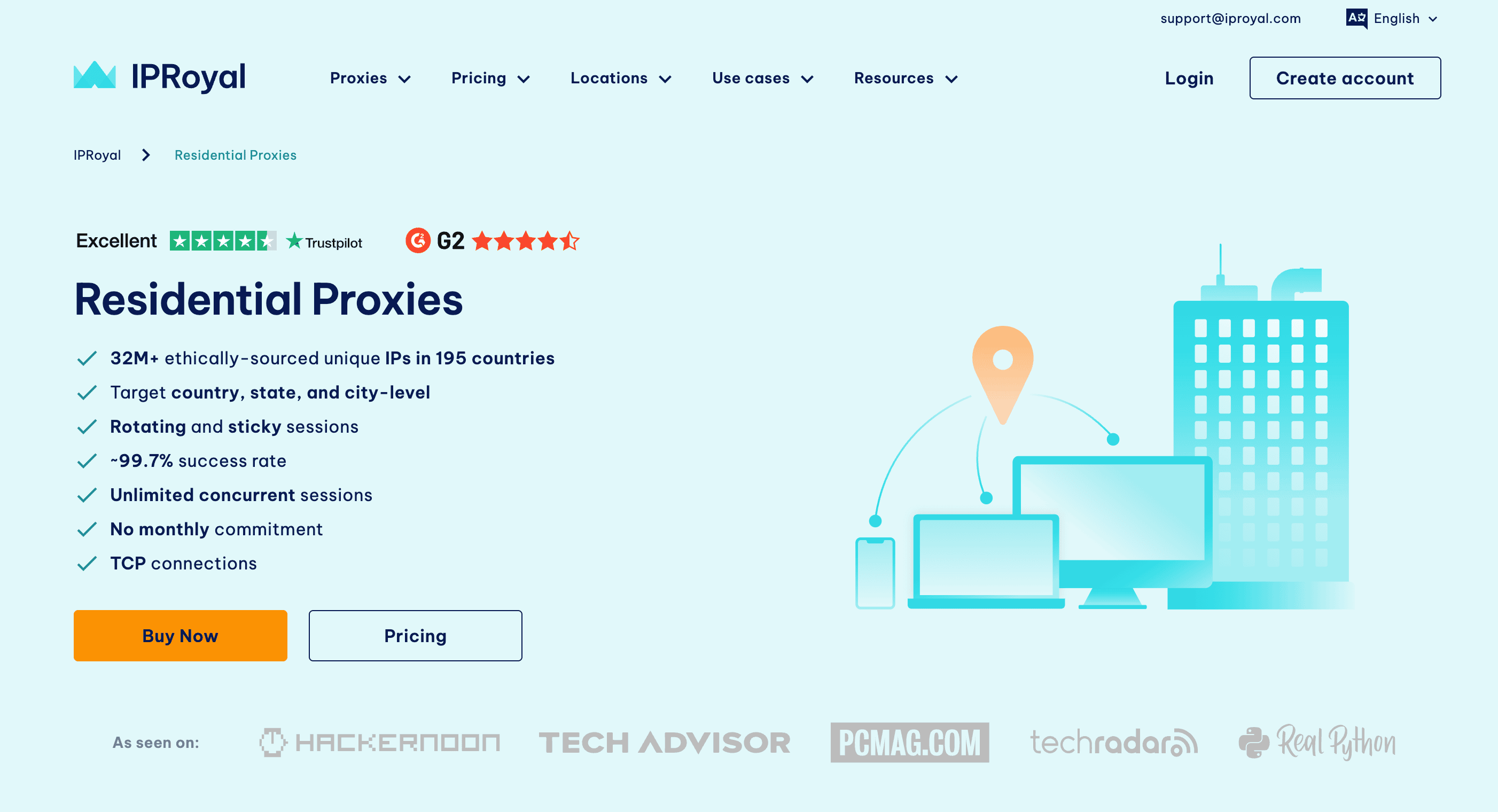
IPRoyal offers a range of proxy services, including residential proxies that have gained attention in the online privacy and data collection spheres. These proxies allow users to route their internet traffic through real residential IP addresses, potentially improving anonymity and bypassing certain restrictions.
Reviews of IPRoyal's residential proxy service highlight various aspects of their offering. Users report mixed experiences, with some praising the service's reliability and others noting challenges with pricing and support.
Their service includes:
- Over 8 million IPs
- Coverage in 190+ countries
- Sticky sessions
- Unlimited concurrent connections
IPRoyal provides a straightforward pricing structure and offers both metered and unmetered plans. Pricing starts from $7 for 1 GB of traffic, and scales up to $2.45 per GB at 5000 GBs.It also offers dedicated proxies for specific use cases, like 'sneaker copping'.
Soax
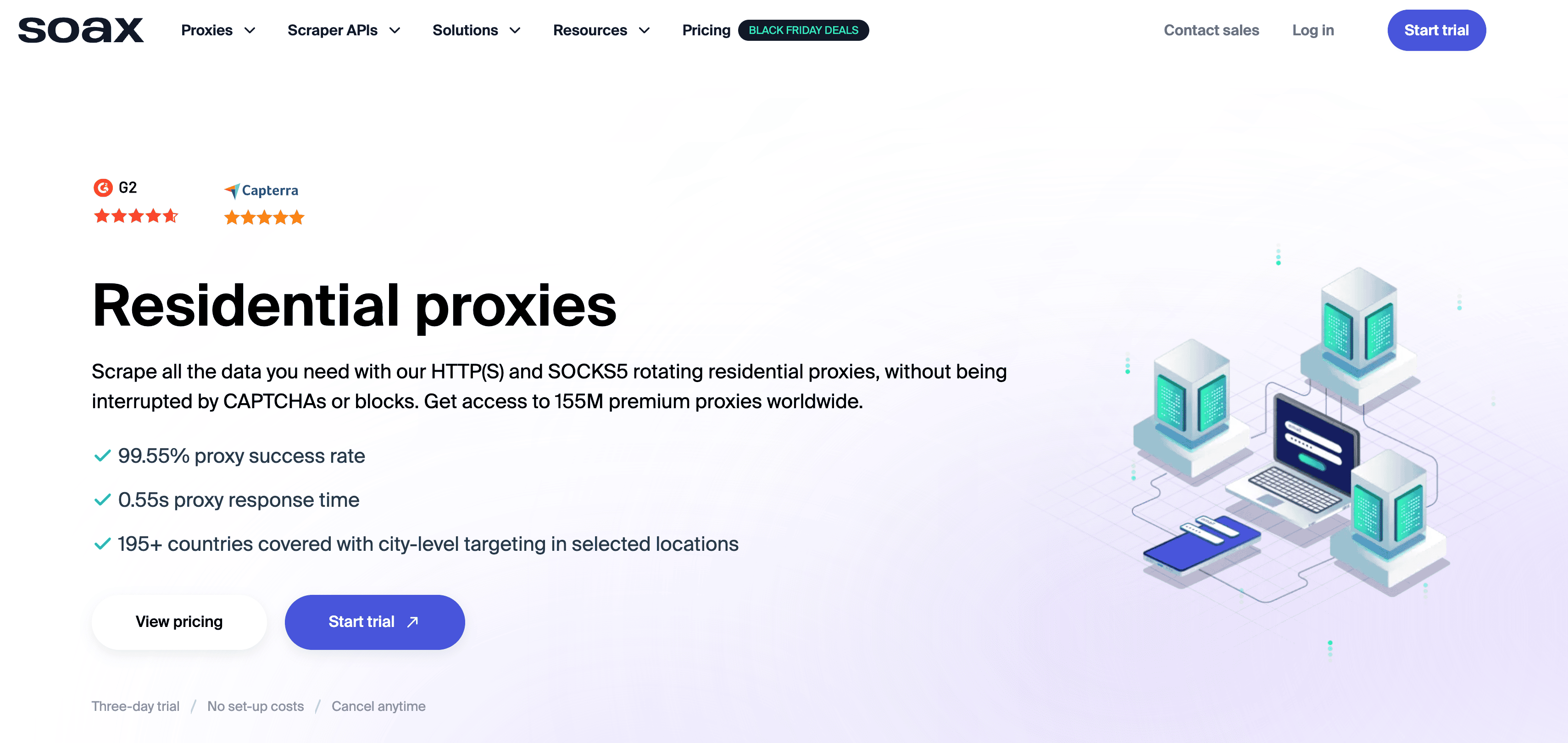
Soax provides a residential proxy network with over 5 million IPs across 150+ countries. Their service includes:
- Rotating and sticky ports
- City and ISP targeting
- Backconnect nodes
- Detailed connection statistics
Soax offers a user-friendly control panel and flexible pricing options. SOAX's residential proxy plans start at $99 for 15 GB of data, which equates to $6.6 per GB. This entry-level plan also includes 300 ports for users. For larger data requirements, SOAX provides plans up to 5 TB at a more cost-effective rate of $2.2 per GB.
The pricing structure is designed to accommodate both small businesses and enterprises with substantial proxy needs. SOAX does not offer a pay-as-you-go option, which may be a consideration for users with fluctuating proxy requirements.
Rayobyte
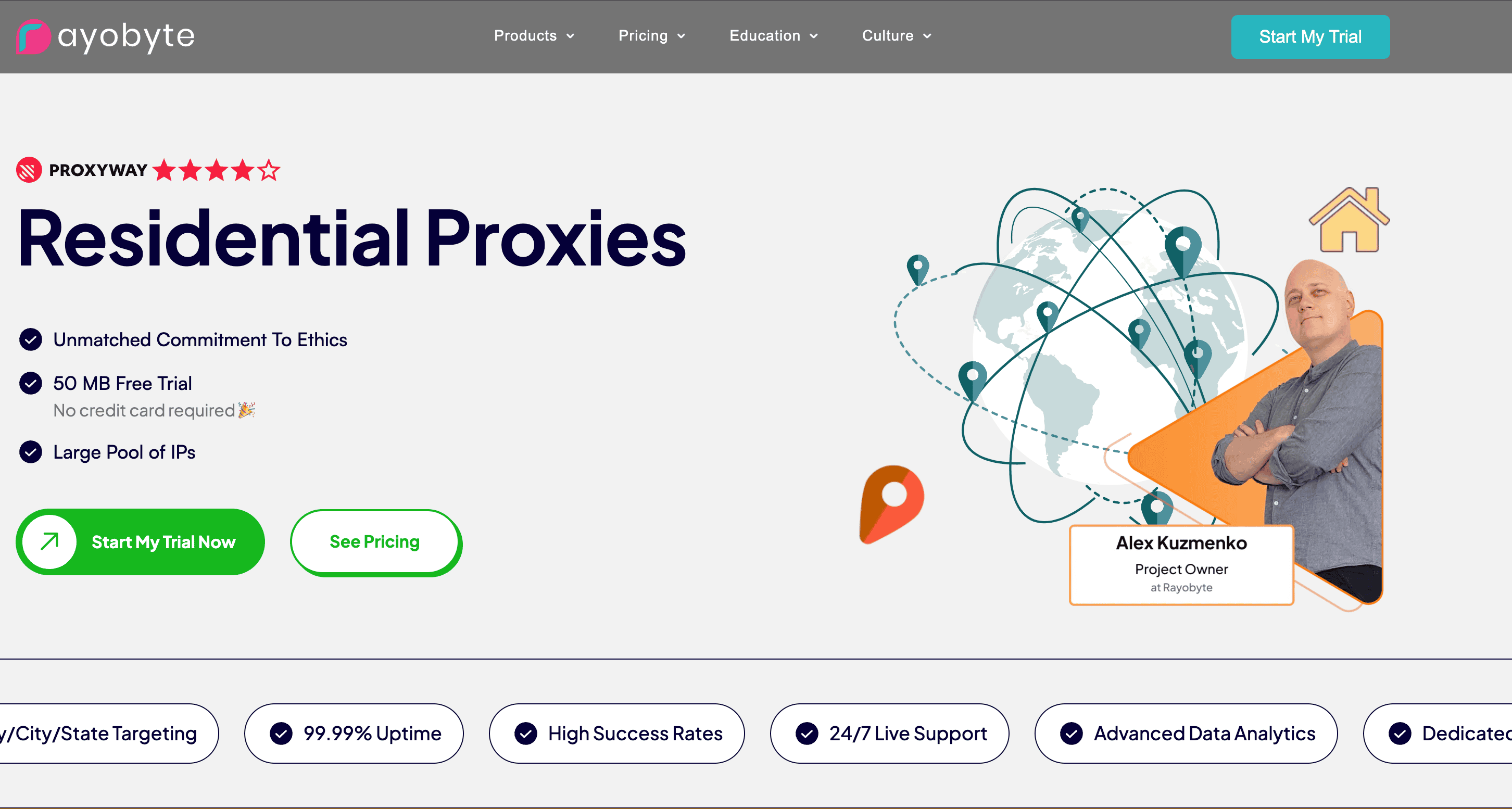
Rayobyte offers a smaller but high-quality residential proxy network. The company's residential proxies allow users to access geo-restricted content and perform web scraping tasks effectively.
Residential proxies from Rayobyte come with several advantages. Users report high speeds and reliability, which are crucial factors for many online activities. The large proxy pool ensures that IP addresses are regularly rotated, reducing the risk of detection and blocking.
While Rayobyte's residential proxies receive positive feedback for their performance, some users note limitations in proxy availability. The company addresses this by continually expanding its network. Rayobyte also offers additional proxy types, including datacenter and ISP proxies, providing flexibility for various use cases.
- City and state-level targeting
- Detailed proxy health metrics
- Integration with major automation tools
Rayobyte offers both pay-as-you-go and standard subscription based pricing options. Their 'Starter' pay-as-you-go subscription starts at $7.50 per GB, for usage between 1 - 15 GB, and scales to as low as $3 per GB for the 'Enterprise' tier.
Their subscription plans compare similarly, starting at $6.67 per GB for a Starter plan (15 GBs) and scaling as low as $3.20 for 1000 GBs, and even $2.40 per GB for 5000 GBs.
Netnut
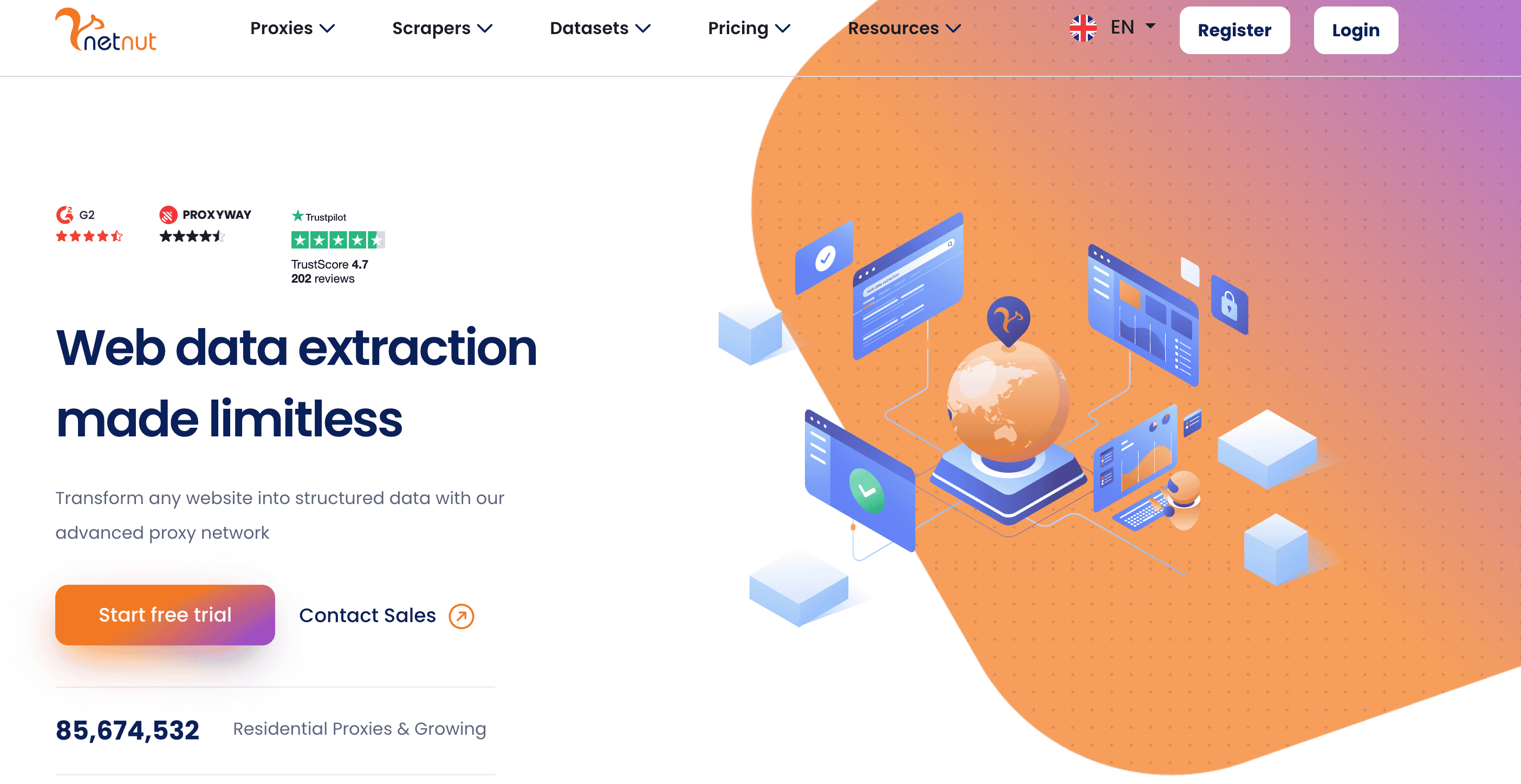
Netnut distinguishes itself by providing static residential proxies through partnerships with internet service providers. Their network offers:
- Over 10 million residential IPs
- Coverage in 50+ countries
- City-level targeting
- Unlimited concurrent connections
NetNut's residential proxies have received positive reviews for their reliability and performance, with users praising the service's high success rates and IP uniqueness. These factors make NetNut a popular choice for various applications such as web scraping, data aggregation, and market research.
While NetNut's services come at a premium price point, many users find the cost justified by the quality and effectiveness of the proxies. The company's direct connections to ISPs set it apart from competitors who rely solely on peer-to-peer networks, potentially offering more stable and consistent performance.
Advanced Features of Residential Proxies
Residential proxies offer sophisticated capabilities that enhance user anonymity and flexibility. These features provide granular control over IP addresses, geographical targeting, and session management for various online activities.
IP Rotation and Sticky Sessions
IP rotation allows users to change their IP address at specified intervals automatically. This feature is crucial for avoiding detection and maintaining anonymity during web scraping or data collection tasks. Rotating residential proxies can switch IPs with each request, making it difficult for websites to track or block activities.
Sticky sessions, on the other hand, maintain the same IP address for a set duration. This is useful for tasks requiring consistent identity, such as managing social media accounts or completing multi-step website processes. Users can typically set session duration from a few seconds to several minutes.
Some providers offer rotating and static residential proxies, allowing users to choose the most suitable option.
Geo-Targeting Capabilities
Geo-targeting enables users to select IP addresses from specific countries or cities. This feature is invaluable for accessing location-restricted content, testing regional versions of websites, or conducting market research in particular areas.
Advanced proxy services offer extensive geographical coverage, with some boasting IP pools from over 100 countries. Users can often filter by country, state, or city to precisely target their desired location.
Some providers also offer ASN (Autonomous System Number) targeting, allowing even more specific location selection based on internet service providers.
Session Control and Management
Session control features give users fine-tuned management over their proxy connections. These features include the ability to start, stop, and reset sessions on demand.
Advanced proxy services often provide APIs or user-friendly dashboards for easy session management. Users can monitor active sessions, set custom rotation intervals, and adjust other real-time parameters.
Many providers also offer concurrent session limits and bandwidth allocation controls. These tools help users optimize their proxy usage and manage costs effectively.
Some services include automatic error handling and retry mechanisms, ensuring smooth operation even when individual IPs become unavailable or blocked.
Evaluating Proxy Providers
Choosing the right residential proxy provider requires careful consideration of several key factors. These include essential features, performance metrics, and compliance/privacy practices.
Key Features to Consider
When evaluating residential proxy providers, look for a robust proxy pool size and diverse IP locations. Providers should offer flexible bandwidth options and user-friendly interfaces.
Geo-targeting capabilities are crucial for accessing region-specific content. Assess whether the provider offers city and state-level targeting.
Authentication methods matter. Look for providers supporting IP and username/password authentication for enhanced security.
Rotation settings are important. Providers should offer customizable IP rotation intervals to suit various use cases.
Criteria to Assess Performance and Reliability
- Speed and uptime are critical performance indicators. Test the proxy network's response times and connection stability.
- Examine the provider's success rates for requests. Higher success rates indicate better reliability and fewer blocked requests.
- Check for concurrent connection limits. More simultaneous connections allow for increased scalability.
- Evaluate the proxy network's ability to handle high-volume requests without compromising performance.
- Look for providers offering static residential proxies with 24/7 availability for consistent performance.
Regulatory Compliance and Privacy Concerns
As data privacy regulations tighten globally, proxy services face new challenges. Providers must adapt their practices to ensure compliance with evolving laws while maintaining service quality.
User privacy protection is becoming a key differentiator among proxy vendors. Many are implementing stricter data handling policies and enhancing encryption methods.
Transparency in proxy sourcing and usage will likely become more important. Providers may need to offer more detailed information about their proxy networks to build trust with users and regulators.
Some jurisdictions may introduce specific regulations for proxy services. This could increase operational costs and potentially limit service offerings in certain regions.